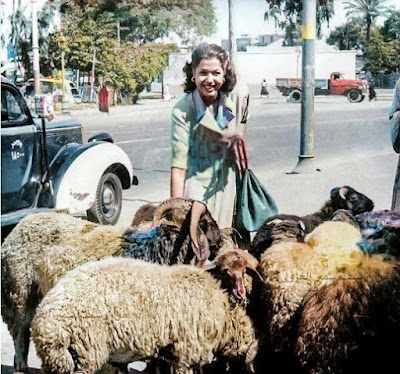 |
| Samia Gamal buying a sheep for Eid Al-Adha in Cairo in the early 1950s |
However, this year's Eid Al-Adha feels different for many Egyptians, as they are directly feeling the effects of the economic crisis, particularly when it comes to the consumption of food, especially meat.
Updated on Tuesday 4th July:
Haitham Abdel Basset, the vice president of the Butchers Division said in statements from four days ago in Al-Masry Al-Youm that the demand on meat during the Eid Al-Adha season went down by 80%. Abdel Basset added that this was the worst year ever for the butchers
Official agencies in Egypt have released statistics in the past few weeks that shed light on this situation.
The prices of live red meat, including beef, lamb, and goat, have risen by 100%, while the prices of red meat after slaughter have increased by 105%.
In a nationwide survey conducted by the Egyptian Cabinet's Information and Decision Support Center (IDSC) in mid-June, it was found that 68% of Egyptian citizens had no intention of buying sheep, cattle, or even sacrificial vouchers for charities this year.
Only 19.9% of citizens expressed their intention to buy sheep while the remainder are still undecided.
What are sacrificial vouchers?
According to the sacrifice voucher program that appeared in recent years, the donors give full authority to charities that provide the service to slaughter the sacrifice and distribute meat to needy people on their behalf during the feast.
Sacrificial vouchers have become a popular and affordable option for many Egyptians who prefer not to go through the hassle of buying and caring for live animals until Eid, as well as the mess of slaughtering animals at their homes.
 |
| A booth selling meat from the Ministry of Agriculture's farms with reduced prices at Egypt's Spring Flowers 2023 Fair |
In our family, we have used sacrificial vouchers for the past three years, especially during the coronavirus pandemic.
However, this year, two of my relatives from the upper middle class decided not to purchase sacrificial vouchers due to their increased cost. The price of sacrificial vouchers has soared by 110% this year.
It is worth noting that for many people in need, Eid Al-Adha is an important occasion as it provides them with an opportunity to receive meat through charitable organizations for free.
According to Central Agency for Public Mobilization and Statistics "CAPMAS," data from November 2022, around 90% of households in Egypt have already reduced their consumption of proteins such as meat, poultry, and fish since the onset of the crisis.
Estimates from the Food and Agriculture Organization "FAO" suggest that 45% of Egypt's population cannot afford a well-rounded diet, while a staggering 85% cannot afford the costs of a healthy diet.
It is expected and the percents are going to be higher in 2023. The annual headline inflation rose in May 2023 officially to 33.7% according to CAPMAS.
Compared to May 2022, the price of food and beverages in May 2023 increased by 58.9%. Prices of meat and poultry surged by 87.9%.
This situation according to the FAO's report has led to health issues such as obesity, malnutrition, and prevalent anaemia among Egyptians, largely due to an overreliance on carbohydrates instead of proteins and vegetables.
Back to the meat situation, Haitham Abdel Basset, the vice president of the Butchers Division, revealed in previous media statements that Egypt has witnessed a decline of approximately 60% in its domestic livestock industry's production capacities over 2022.
Additionally,30% of butchers left the business, and 70% of farmers have abandoned livestock farming.
Several factors have contributed to this decline, including the 400% increase in the price of imported animal feed resulting from the Russian invasion of Ukraine and the challenges faced by the Egyptian pound.
The rise in fuel prices and its impact on transportation costs also cannot be ignored.
So, yes, this is not an easy Eid for many Egyptians.
But still, happy and blessed Eid to all of you, whether you have a beef plate on your dining table or not.
FYI, this post would have taken a lot of time if it were not for the American University in Cairo's Alternative Policy Solutions Center's latest newsletter.
You should follow the work of the Alternative Policy Solutions Center before anyone tells you that there is no alternative in Egypt.


Egyptians do not mind that. They are happy with the status quo. It is just the elitist middle class who are complaining. No body cares.
ReplyDelete